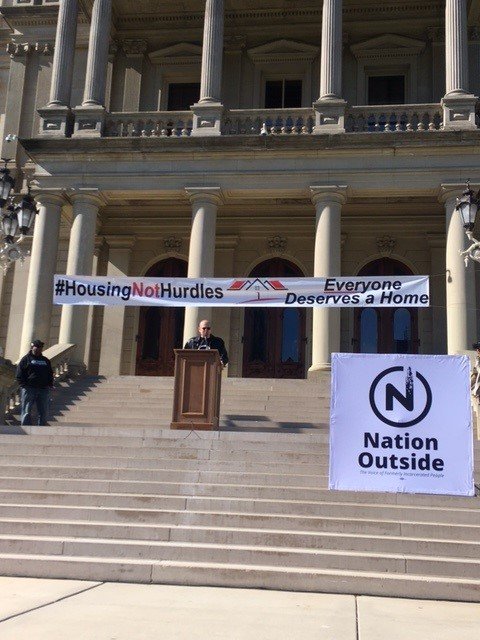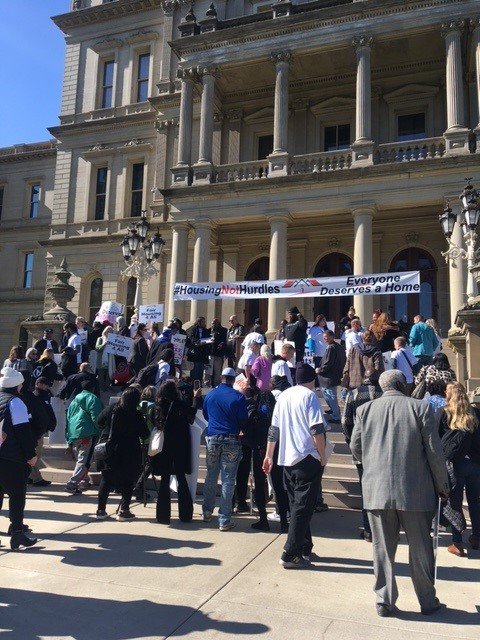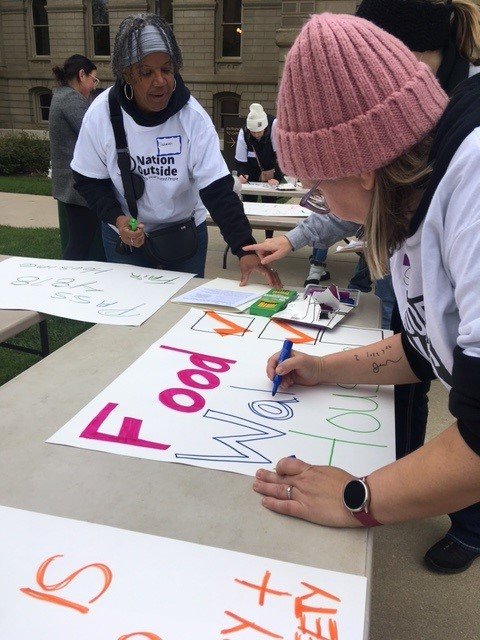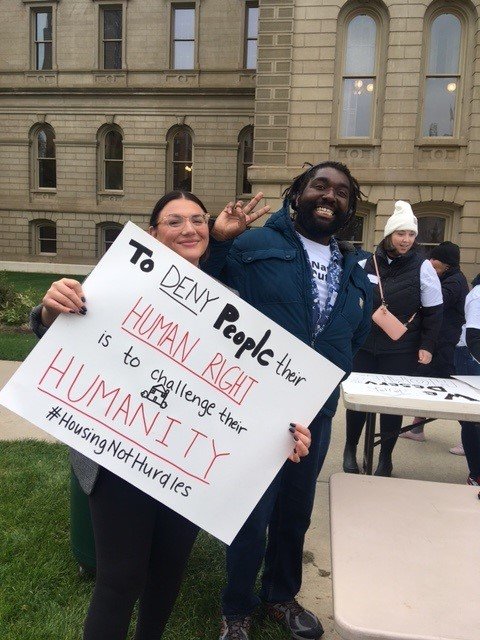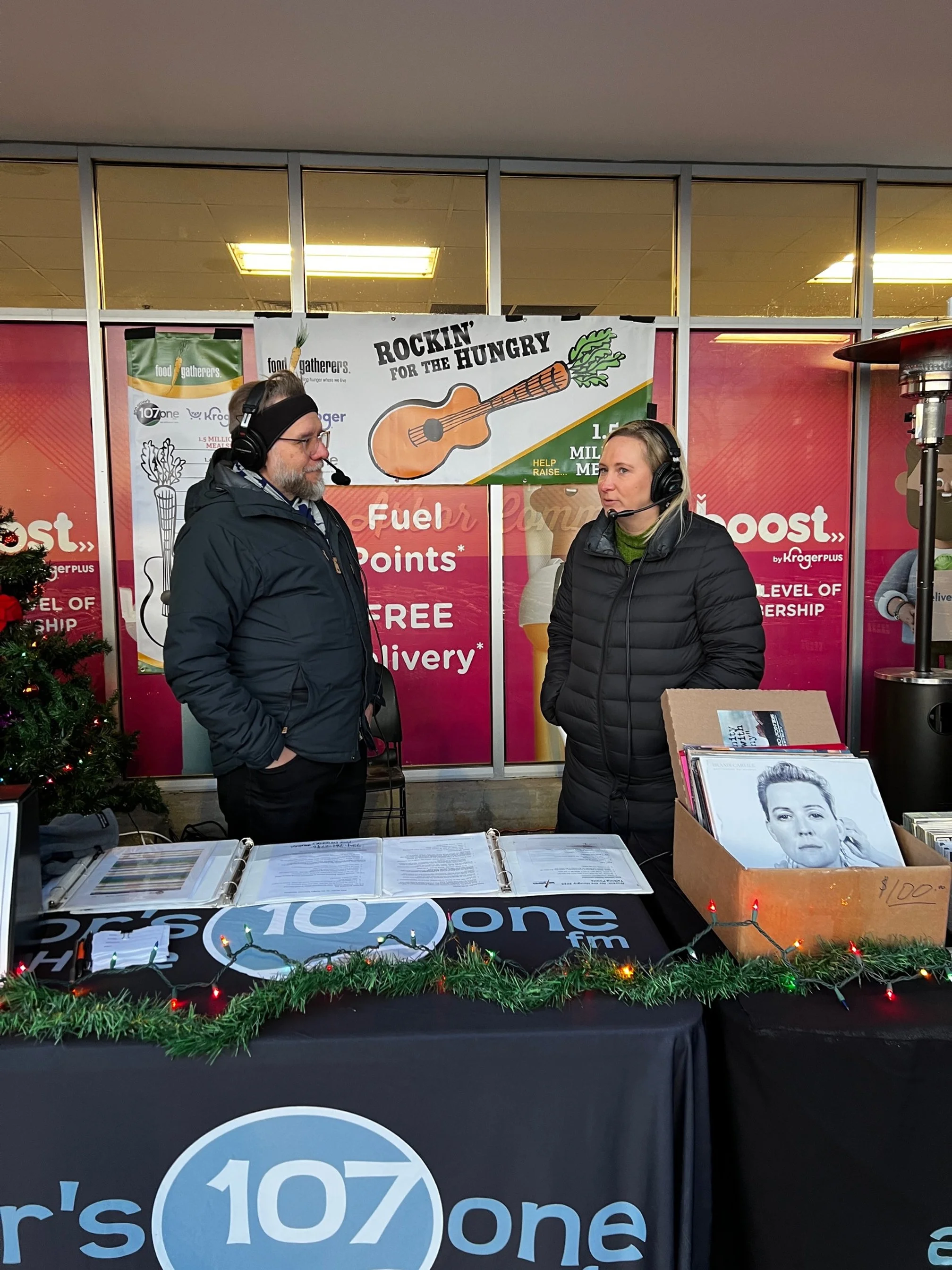Current Advocacy
Current Advocacy Opportunities
Advocacy is one of our many guiding principles. As such, we affirm that direct services to the people experiencing homelessness will include advocacy, and that the work of the Washtenaw Housing Alliance will include changing institutional policies and practices, training of professionals, policy and legislative change, educating funders, and raising hell when necessary.
—> —> UPDATE on HUD’s Continuum of Care (CoC) Program Funding <— <—
Since November 2025 HUD has sowed chaos by creating unnecessary delays and greater uncertainty for communities across the country funded by HUD’s FY2024-2025 Continuum of Care (CoC) Program. When HUD released a new and harmful funding competition notice in late fall, it jeopardized the vital CoC resources these communities use for permanent housing.
For Washtenaw County, that new Notice of Funding Opportunity (NOFO) put $7 million in CoC funding for permanent housing at-risk. If implemented, more than 800 people in our county could have lost their housing. Fortunately, HUD rescinded that NOFO in early December.
HUD’s demonstration of irresponsible decision-making meant the need for the courts to intervene. Read here a timeline of what HUD has been attempting to do, the lawsuits and court hearings in response to HUD’s actions, and an update on where we are now with the CoC Program funding.
Local Advocacy Opportunities
-
Now through April 2026 shelter staff and community volunteers with the Shelter Association of Washtenaw County’s Delonis Center and Interfaith Hospitality Network at Alpha House and Alpha House East, and Daytime Warming Center are coordinating winter emergency shelter and daytime warming centers.
To view the full list of daytime shelters and overnight information, please visit bit.ly/washtenaw-warming.
To pitch in as a volunteer or make a donation you can sign up once or weekly – any commitment is appreciated!
-
When aspects of H.R.1 takes effect in 2026, it will mark the beginning of significant cuts to Medicaid, totaling $1 trillion over the next 10 years, as we reported previously. That means that as many as 10 million people over the next decade will lose healthcare coverage for doctor visits, medicine, and other necessary healthcare services as states adapt their programs to comply with the new law.
Other changes, such as new administrative requirements, are more technical but equally important. In this post, we will focus on one vital aspect of the program that will impact many affordable and supportive housing residents: More Frequent Eligibility Determinations. These new government-imposed legal requirements affect those who have only proven a low income to the state and are called the ‘expansion population’. This Medicaid expansion population includes many people experiencing homelessness or housing instability, as well as formerly homeless people. People who are young (under 18), older adults (over 65), or considered disabled by federal determination will not be impacted by this particular change.
Why Eligibility Determinations Impact People Experiencing Homelessness or Housing Instability
The new “Eligibility Determination” rule assumes consistent access to communication from the state and access to technology, which are resources that many people experiencing homelessness or housing instability lack. Without a permanent address, reliable internet, or transportation, they may miss notices, be unable to submit documents, or struggle with online forms and in-person interviews. These barriers mean even fully eligible individuals will risk losing coverage, jeopardizing critical health care and supportive services.
As stated previously, millions are expected to lose health care coverage. They are losing coverage not because they are ineligible, but because they will have additional administrative burdens under the new law. The law is creating a more onerous bureaucratic challenge for individuals by increasing the frequency with which they must prove their eligibility for their state’s Medicaid program. The requirement to confirm eligibility will likely result in many otherwise eligible individuals losing coverage, and this will have a cascading effect on the supportive services that are essential in helping people prevent or end their homelessness.
Those who lose health insurance coverage will also likely lose access to other critical services, including case management, behavioral health services, medications, and specialty care. The result is that millions more people will turn to short-term emergency room visits or inpatient care, which have a limited impact on overall health and stability, but will be their only option for healthcare.
Medicaid programs differ from state to state. Each state sets its own rules for who qualifies, what benefits are available, and how people in different population groups can access those benefits. While definitions vary by state, most include a few common categories of eligible groups of people, such as:
Children (under age 18)
Pregnant and postpartum women (postpartum is commonly defined as up to 12 months after giving birth)
Elderly, blind, and disabled people. Disability is commonly defined as determined by the Social Security Administration as receiving Disability | SSA.
Expansion population (in states that expanded Medicaid under the Affordable Care Act, these are adults between the ages of 19 and 64 who need only prove low income)
Among the above groups, H.R.1 requires that ONLY the last group listed—the expansion population—must now prove Medicaid eligibility once every six months, rather than once every 12 months. All other groups will continue with annual eligibility checks. Each state Medicaid program has their own “redetermination process” to prove a person is still eligible for Medicaid. Most states have an online process, while a few still require an in-person interview.
The law requires CMS to issue guidance for states on this process by the end of 2025 and the states must have the new requirements implemented by January, 2027.1 Congress has allocated $75 million nationally to support implementation.
Given the vital nature of continuous health insurance coverage for potential and active supportive housing residents, we recommend the following three strategies to ensure coverage for those we serve:
1) Influence Your State’s Implementation Process
For the next 18+ months, states will set up systems to implement H.R.1. You can influence that process through advocacy and by sharing stories of those you serve. We know from narrative research that we can help a broader public understand the critical nature of Medicaid when we tell stories that show how people live their whole lives thanks to the regular or life-saving healthcare they receive through Medicaid.
Most states have state-level coalitions focused on ensuring healthcare coverage for all, and Florida Voices for Health | Home has compiled a helpful national list of these agencies. Join your state’s coalition and lift the voices and narratives of those experiencing homelessness or housing instability. CSH has created a State Solutions brief; National Health Care for the Homeless has created its own brief. Both are filled with practical ideas to limit coverage losses among those experiencing homelessness or housing instability.
2) Data Is Power: Track Health Insurance Coverage of Those You Serve
Agencies that offer shelter or housing assistance should track the health insurance coverage of those they serve. While each state refers to its Medicaid program by a different name, the federal HealthCare.gov website maintains a helpful searchable database of these program names.
Agencies should track a variety of data, including:
Does the person have health insurance coverage?
If yes, why, where and how do they get their coverage? Medicaid, Dual Medicaid and Medicare, Veterans, Marketplace, Children’s Health Insurance Program (CHIP), or private coverage are the most common options.
If a person is covered via Medicaid, are they part of the expansion population and therefore soon to be subject to six-month reviews, work requirements, and cost sharing?
If a person is covered via Medicaid with a Managed Care Organization (MCO), which MCO provides health insurance coverage?
Compile, aggregate, and share this data with state healthcare coalitions, state officials, and MCOs to gain assistance and new resources to help those you serve maintain continuous healthcare coverage.
3) Helping Hands: Build Training and Operational Supports
Some states designate an official role called a navigator or application assister. This person is identified by a potential or current beneficiary and is authorized to access their online account and help with the redetermination process.
Each state sets its own rules for:
The responsibilities of the role
Required training
Account access privileges
In many states, application assisters receive notifications when a beneficiary needs to start the redetermination process. They may also:
Upload documents (e.g., an updated SSI award letter)
Provide other support to help maintain coverage
In preparation, agencies should:
Research state-specific training and qualification requirements for application assisters
Train and support one or more staff members in this role
Once trained, the staff members can receive emails or hard-copy materials and take the necessary steps to maintain the beneficiary’s health insurance coverage.
Most states have online materials that map the process for applying for and maintaining coverage. Familiarize yourself with your state’s processes and train your case management staff in them so they can best assist potential or current beneficiaries. Homebase, based in California, has both a national and California-specific toolkit to help train your staff and teams. Your state-specific health care access coalitions may also have detailed materials that can support your efforts.
The Ultimate Goal: Continuous Coverage
Continuous health insurance coverage is critical for these individuals to access the services necessary to thrive in their communities. Helping them meet new six-month Medicaid eligibility checks beginning January 1, 2027, will help protect their coverage, their services, and enable them to remain stably housed.
-
It is going to take all of us working together to end homelessness in our community. Pledge your commitment to advocate and fight for affordable housing in Washtenaw County.
-
The Advocacy & Communications Committee is vital in supporting the WHA’s local, state, and federal advocacy actions as well as amplifying communication alerts. This committee typically meets virtually several times in the year.
-
On June 4th the Winter Shelter Task Force presented during Working Session to County Commissioners updating on winter shelter planning for the upcoming winter season. The recording of the presentation as well as the full session can be watched here. It is anticipated that Commissioners will present a resolution to invest in winter sheltering for 2025-26 before the end of summer.
Last September, the Task Force presented to County Commissioners about response plans for the 2024-25 winter season. The recording of the presentation as well as the full session can be watched here. The presentation slide deck can be viewed here.
The Task Force is a collaboration of over 25 individuals from close to 20 organizations and county offices who participate in the County’s Continuum of Care. It was created in April 2023 to:
Help analyze existing data and programs for winter shelter,
Research best practices for providing winter shelter in our Michigan climate,
Develop strategies and recommendations, and
Identify funding necessary to provide winter sheltering for all populations.
Following the Task Force's presentation in its first year, County Commissioners passed a resolution to support additional investments in homeless programs for that upcoming winter. WHA was grateful for the passing of the $2.18M resolution which supported investments in eviction prevention and shelter diversion, winter shelter staffing and support, and short-term hoteling. Thank you to everyone who supported our call for advocacy to help get this resolution passed!
State Advocacy Opportunities
-
On December 30th, 2024 Governor Whitmer signed the source of income (SOI) non-discrimination Senate bills into state law (the House bills were signed on January 16th, 2025). The new statewide tenant protection under the Elliott-Larsen Civil Rights Act took effect on April 2nd, 2025.
Since April 2nd, source of income is now a protected class under the Elliott-Larsen Act. This means that landlords with five or more rentals must accept non-wage sources of income such as Housing Choice Vouchers (HCVs), veterans’ benefits, alimony, MDHHS cash assistance, or SSI/SSDI as part of a tenant’s legal total combined income. Previous to the new law, this type of non-discrimination was only protected in the cities of Ann Arbor and Ypsilanti in Washtenaw County.
Landlords and tenants wanting more information about the new protected class can watch Michigan Department of Civil Rights’ Fair Housing Law and Renters’ Rights webinar recording. The webinar breaks down what source of income is and what can be considered discriminatory. Other available materials from the webinar include:
Civil Rights Enforcement Presentation by the Office of Legal Affairs (link here)
Reasonable Accommodations and Modifications in Housing by the Disability Rights and Compliance Division (link here)
Landlords and tenants can also visit these Fair Housing Center webpages for more details on source of income protections:
Fair Housing Center of Southeast and Mid-Michigan Source of Income webpage and downloadable Fact Sheet. If you have any questions about your fair housing rights, please call their office at 877-979-FAIR (3247).
Fair Housing Center of West Michigan downloadable Fact Sheet.
-
On September 9th the Michigan Senate Housing and Human Services Committee held a second hearing on a Senate Bills Package 372, 373, 374, and 375. The package includes bills related to junk fees, credit report usage, and eviction sealing/expungement that are being reintroduced this legislative session. Watch the committee hearing here.
The Committee heard testimonies on these bills back at their June meeting but included at their September meeting time to hear additional testimony ahead of holding votes on the bills. The bills were reintroduced from the last legislative session.
In the words of one of the testifiers, “When you take account of where the rental housing market is today, I think it compels the response that these bills offer.” All four bills were voted favorably out of committee without amendment, sending them back to the Senate.
-
On June 3rd the Michigan Senate Housing and Human Services Committee held a hearing on Senator Sarah Anthony‘s Tenant Empowerment Package (Senate Bills 19, 21, and 22).
The Tenant Empowerment Package is designed to protect tenants, providing them with the tools they need to advocate for their rights by:
Enshrining tenants’ Right to Repair into law by giving tenants the ability to remedy any unsafe conditions within their own homes if landlords fail to begin repairs in an appropriate timeframe;
Ensuring adequate notice for rent increases to give people time to plan, budget, and prepare; and
Allowing the electronic return of tenant security deposits to modernize this process for landlords and tenants alike.
Since Sen. Anthony introduced the package, nearly 150 Michiganders have signed on as citizen cosponsors of the package, demonstrating the grassroots support for the legislation.
Following a vote by the Senate Committee on Health and Human Services on June 10th, Senate Bills 19-22 were favorably reported out of Committee. The bills now advance to the Senate floor for further consideration and future vote.
Read more on the benefits of passing these senate bills via Michigan Advance here.
-
Systems change begins with informed advocacy. By monitoring state-level legislative activity, we can collectively drive progress in housing and homelessness.
The Michigan Coalition Against Homelessness (MCAH) Legislative Tracker allows you to:
Monitor legislative activity by viewing a current list of state bills and tracking their status.
Understand legislation with clarity through easy-to-understand bill summaries.
Engage directly with policy makers using our simple click-to-send email templates.
Follow at mihomeless.org/legislative-tracker-tool
-
Read recent progress update here.
In July 2024 MCTEH provided progress updates on its 2023-2025 State Action Plan. The MCTEH Action Plan outlines six (6) key goals that establish the parameters for what it will take to work toward ending homelessness in Michigan over the next three (3) years.
-
The WHA created the video Improving the Tenant Experience in Michigan to highlight what more can be done to improve a tenant's housing experience in our state. Certainly more affordable housing is needed, but so too are laws to protect tenants from "junk fees" when applying for or renting housing or even to expunge their eviction records from long ago.
Federal Advocacy Opportunities
-
Advocacy Action via National Homelessness Law Center (NHLC)
Tell Your Reps: Reject Homeless Detention Camps
Everybody needs a safe place to live. Instead of focusing on proven solutions to homelessness, like housing and support, Utah is proposing taking money away from programs that solve homelessness to build a massive, remote, government-run detention camp.
We have seen this before. Detention camps are not a solution for anyone–not homeless people, not immigrants, not anyone. Utah has indicated that it will ask the federal Government to help fund this project.
We can still stop this. We need your help to demand “No Federal Funding for Homeless Detention Camps.”
Housing Not Handcuffs recently hosted a National Organizing Call to launch this new campaign: No Federal Funds for Homeless Detention Camps. We heard from and strategized with folks on the ground in Utah, as well as leaders in mental health, immigrant rights, and legal advocacy. Congresswoman Delia Ramirez (IL-03) and Congressman Maxwell Frost (FL-10) were also able to join the conversation. Watch the webinar here.
-
Important update courtesy of CSH
New address verification requirements in H.R.1 could put thousands at risk of losing Medicaid coverage, especially people in supportive housing or experiencing homelessness. Without thoughtful implementation, these policies may disrupt care for those who rely on Medicaid for essential health services. States must act now to ensure continuous coverage as a cornerstone of an effective Medicaid program.
Read CSH’s latest blog which shares practical strategies to influence address verification policies and protect Medicaid coverage for the people you serve.
-
Advocacy Alert via National Low Income Housing Coalition and National Housing Law Project (NHLP)
Amid uncertainty about the future of mixed-status households enrolled in HUD housing programs, the NHLP released a resource with guidance for HUD tenants about sharing immigration status information with HUD housing providers. Responding to reports received by NHLP about HUD housing providers making improper requests for verification of immigration status, the Know Your Rights resource contains information for mixed-status HUD families about their rights when responding to such requests from public housing authorities, owners, or voucher landlords.
The resource includes a review of the current law regulating mixed-status households living in HUD-assisted housing and the rights of tenants who are asked by HUD housing providers for information about immigration status. The Know Your Rights resource walks through different scenarios based on the request for information and the information a tenant has previously shared. The resource also includes example forms that household members not declaring HUD-eligible status may be asked to complete.
A Spanish language version of the resource will be available in the coming weeks.
Find the resource at: nhlp.org/kyrdata.
Tenants seeking further assistance from a local legal organization can go to lawhelp.org.
-
Anticipating possible raids seeking undocumented immigrants by Immigration and Customs Enforcement (ICE) agents at homeless service providers and shelters, the National Homelessness Law Center (NHLC) offers practical guidance for service providers about what to do before, during, and after any such attempted raid to protect both your staff and clients from harm.
What to do Before an Enforcement Action:
Understand current NHLC Guidance and provide training on the basics to Staff
Designate space as public and non-public accordingly
Understand the difference between a judicial warrant and an ICE administrative warrant
Understand how to handle the collection and retention of client information
Understand how to respond to requests for information for immigration enforcement purposes
Put up Know Your Rights poster (Exhibit to NHLC Guidance)
What to do During an Enforcement Action:
Stay calm, treat the officers with respect, and notify a supervisor
Document the officers’ names and badge numbers
Inform the officers that they do NOT have consent to enter private areas
If they claim to have a warrant to enter, ask to see it and check that it is signed by a Judge or Magistrate
OK to Remind clients of their right to remain silent and to speak with a lawyer if detained or arrested
OK to Videotape but do not interfere with the officers
What to do After an Enforcement Action:
Document the actions taken by ICE
Date/Time of Action
How many agents/Names/Contact information
How did the agents’ uniforms identify them? ICE or police?
Why did they say they were at the facility?
Did you ask to see a judicial warrant?
Did you deny consent to enter?
Use the ICE/Police Immigration Enforcement Report Form (Exhibit in the NHLC Guidance)
Best way to make sure your organization’s response to ICE doesn’t feel like an emergency, is to make a routine preparing all service provider staff in knowing what to do. Practice, practice, practice!
-
The National Immigration Law Center and Center for Law and Social Policy together released a new “Know Your Rights” resource, available in English and Spanish, for parents detained by the U.S. Immigration and Customs Enforcement (ICE). The current administration has used immigration enforcement to threaten and intimidate immigrant communities, and evictions are occurring in Black and Latino communities with concerns for due process and illegal tactics. For this reason, NLIHC is working to defend immigrant communities’ access to housing and ensure advocates know ways to engage in policy advocacy and protect their communities. Access the resource in English here and aquí en español. Additional languages forthcoming; monitor CLASP’s website for further updates.
In short, here are five things for parents to know:
You have the right to make decisions about the care and custody of your child at the time of arrest.
You have the right to be kept near your child and stay in touch with them while detained.
You can ask for assistance in most detention centers to help you make plans for your children.
You can be part of your child’s welfare court case while you are in ICE detention.
You can decide whether your child will remain in the U.S. and make alternative care arrangements.
Legal Disclaimer: This resource provides general information. It is not legal advice specific to your situation. To find an immigration attorney, you can search for legal services by zip code by visiting the National Immigration Legal Services Directory.
Read the resource in English here and aquí en español.
-
Tracking via National Council of Nonprofits
After his January 20th inauguration, President Trump signed dozens of Executive Orders (EOs) covering a broad range of issues, including diversity, equity, and inclusion programs; government grants and contracts; civic engagement; immigration; and certain nonprofit subsectors. Some of the EOs won’t take effect immediately, and many are expected to be immediately challenged in court. This chart outlines some of the EOs that may affect nonprofits directly or indirectly.
This document will be updated frequently, so please use this link to see the most up-to-date version: https://www.councilofnonprofits.org/files/media/documents/2025/chart-executive-orders.pdf
Advocacy Resources:
-
Homes Guarantee is an historic campaign organizing for a National Tenant Bill of Rights.
Everyone living in the U.S. should have safe, accessible, sustainable, and permanently affordable housing: a Homes Guarantee. This includes tenants like renters, unhoused people, and mortgage holders.
Want to host your own Imagination Session with friends, family and neighbors on your visions for a National Tenants' Bill of Rights? Download the toolkit here.
Want to share how the housing crisis impacts you and your family, or what home means to you? Share your story here.
-
NLIHC has released the following toolkits:
Advocates' Guide 2025 is a toolkit to educate advocates of all kinds about the programs and policies that make housing affordable to low-income people across the country. Read more and download the toolkit here.
Eviction Record Sealing and Expungement Toolkit 2023 offers recommendations for lawmakers working to enact eviction record sealing and expungement legislation in their jurisdictions. Read more and download the toolkit here.
-
NAEH provides the most important legislative priorities in real time. Sign up for NAEH’s advocacy alerts here.
-
Fair Housing Center of Southeast and Mid-Michigan has several advocacy opportunities to support. Consider volunteering as a civil rights tester or represent FHC as a cooperating attorney. Find out more information at fhcmichigan.org/get-involved.
-
MCAH is helping to engage low-income and housing insecure individuals with registering to vote (registration application here). From 2010 to 2020, individuals earning over $100k were twice as likely to vote as individuals earning under $20k, and only around 10% of homeless individuals voted. Let’s make sure everyone’s voice is represented before the next Election Day on Tuesday, November 3rd, 2026.
Voter registration deadlines in Michigan:
Online registration deadline: 15 days before Election Day
Register by mail deadline: Must be postmarked 15 days before Election Day
In person registration deadline: Available up to and including on Election Day
Highlights from Past Successes
The Washtenaw Housing Alliance thanks its member agencies, partners, and the broader local community for their ongoing participation in our advocacy efforts and their unwavering commitment to ending homelessness and realizing a home for everyone in Washtenaw County. We also thank the many local policymakers who have supported affordable housing and homelessness prevention policies, programs, and funding.
-
On October 30, 2024 the U.S. Department of Housing and Urban Development announced in the 14 communities across the country which will receive federal funding towards their work with establishing plans to prevent and end youth homelessness and fund housing projects that meet system gaps. Congratulations to Washtenaw County for being one of the 14 communities selected!
This is huge for many reasons, but 2 reasons are:
It brings in $4.3M new dollars into our community
Project-awards like our county's are renewable grants under future Continuum of Care Notice Of Funding Opportunity (NOFO) funding cycles
The application for the grant, HUD's Youth Homelessness Demonstration Program (YHDP), was made possible through 18-months of hard work by WHA in partnership with Ozone House, Washtenaw County Office of Community & Economic Development, Michigan Department of Health and Human Services, and members of the Washtenaw Continuum of Care Youth Advisory Board.
Take a look at HUD's press release listing all the recipients joining Washtenaw in receiving YHDP funding.
-
County Commissioners passed a resolution to support additional investments in homeless programs for the 2023-2024 winter at their Wednesday, November 1st, 2023 meeting. WHA is grateful for the passing of the $2.18M resolution which will support investments in eviction prevention and shelter diversion, winter shelter staffing and support, and short-term hoteling. Thank you to everyone who supported our call for advocacy to help get this resolution passed! Read more…
-
On March 21st, 2023 the City of Ann Arbor’s Planning Commission voted unanimously to approve the site plan for WHA member agencies’ Ann Arbor Housing Commission (AAHC) and Avalon Housing 70-unit mixed-use affordable housing development at 121 S. Catherine Street. Read more here on the community engagement process that is guiding the property’s development in the historic Black business district in Kerrytown.
Ypsilanti City Council approved the second and final reading of the PILOT for the 206-210 N. Washington Street development on April 4th, 2023. City Council’s approval enables Avalon Housing to move forward on their plans to bring 22 new one-bedroom apartments to this property site. All units will be affordable and some are set to become supportive housing, providing built-in services like medical care, education and job training as well as transportation particularly for those exiting homelessness. Developers expect to break ground in early 2024.
Read more on this exciting affordable housing project from The Michigan Daily: Everything you need to know about affordable housing at 121 Catherine St (February 19, 2024) and from MLive: Ann Arbor to break ground on Kerrytown affordable housing development in spring (February, 5, 2024).
-
The Washtenaw County Board of Commissioners reviewed and approved funding for seven (7) agencies to receive New Human Services Partnership (NHSP) - Safety Net grants (see the Resolution with award grants here). Due to advocacy from WHA and our partners, the Board also approved new, continued funding for 6-months for agencies previously funded through the Coordinated Funding model and which were not recommended for NHSP awards. Here is the resolution, that was introduced and approved during that meeting, which provides the continued funding for agencies for another 6-months.
-
Ann Arbor City Council voted to allocate the $24M in American Rescue Plan Act (ARPA) funding and as part of that package, they supported:
$1M for housing for the homeless
$3.5M for property acquisition for affordable housing, including up to $500,000 for supportive services for tenants
$1.68M in additional funding for Coordinated Funding support
As well as $3.5M for an unarmed police response, and $1.6M for a basic income pilot program!
In the same April session, City Council also voted to rezone the Old Y-Lot at 350 S. Fifth as a Planned United Development (PUD), making it possible to move forward with development that will create more new affordable housing units!
-
Ann Arbor voters passed the Affordable Housing Millage with 73% support! Prop-C provides a 20-year, 1-mill tax for affordable housing and related services that will generate approximately $6.5M in funding. It provides funding to create approximately 1,500 units of affordable housing, with a portion dedicated to those in need of permanent supportive housing. Thank you to all who donated their time, talent and treasures to ensure the passage of Proposal C, including WHA staff, Board members, member agencies, volunteers, and supporters. We also want to thank everyone involved with Partners for Affordable Housing for running an incredible campaign!



